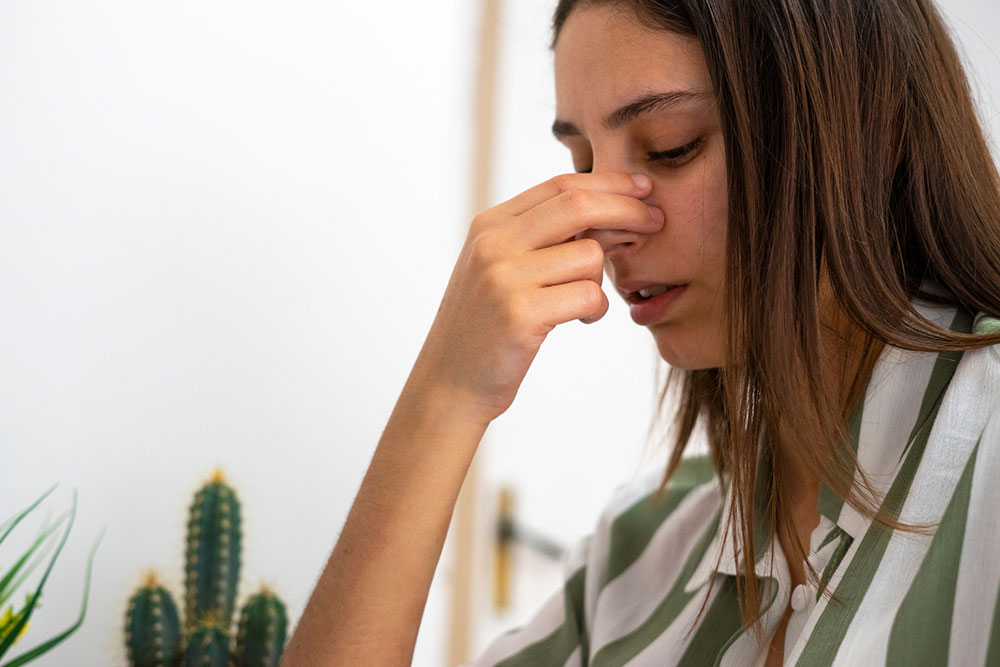
Nasal polyps – Symptoms, causes, and management
Nasal polyps are painless sac-like growths that develop inside the inner lining of the nose. Sometimes, these also form on the hollow areas known as sinuses within the bones of the face. Polyps may even develop in areas close to the cheekbones and the eyes. Usually, these growths are benign and differ in size. The smaller ones do not cause any symptoms, while the larger ones may block the nasal airways and sinuses.
Symptoms of nasal polyps
In most cases, nasal polyps occur due to irritation and swelling inside the nose and the sinuses. This inflammation can last over 12 weeks and is generally called chronic sinusitis. However, it is not necessary that chronic sinusitis always causes nasal polyps. In fact, those with quite small polyps might not even know they have the condition. It is only when the polyps are large or too many that symptoms start to show up. Some common symptoms of nasal polyps are as follows:
- Blocked nose
- Runny and stuffy nose
- Mucus running down the throat, also known as postnasal drip
- Not being able to smell
- Facial pain or headache
- Pain in the teeth
- Inability to taste
- A sense of pressure over the forehead and face
- Snoring
- Nose bleeds
- Itching around the eyes
When to consult a healthcare practitioner
Most symptoms of nasal polyps and chronic sinusitis are similar to other respiratory health problems such as common cold and flu. To rule out these common health problems, it is usually recommended to wait for around ten days to see whether the symptoms persist. If the symptoms last over ten days, it is crucial to consult a doctor and seek necessary treatment. Some major symptoms of nasal polyps that may require immediate medical attention include:
- Quick increase in the severity of symptoms
- Seeing double or experiencing other changes in vision
- Swollen forehead
- Pain or swelling around the eyes
- A bad headache that keeps worsening
- Stiffness in the neck
Causes of nasal polyps
Nasal polyps occur due to inflammation in the sinuses. However, it is not necessary that this inflammation will cause the development of polyps in everyone. Usually, those who have chronic sinusitis due to infection, allergies, or asthma are more prone to nasal polyps. Chronic sinusitis occurs due to prolonged inflammation of the sinuses and the nasal passageways that lasts three months or more. Additionally, some other risk factors given below can increase the probability of nasal polyps:
- Allergic rhinitis or hay fever
- Chronic sinus infections
- Cystic fibrosis
- Hypersensitivity to certain anti-inflammatory treatment options
- Genetics that cause gene mutations leading to nasal tissues reacting severely to inflammation
Common complications of nasal polyps
Sinus infections that cause nasal polyps can often lead to several serious complications. Some of these include:
- Bone infection or osteomyelitis
- Loss of bone
- Abscesses that cause pockets of infection and can spread to the eye sockets and brain
- Meningitis, which causes infection of the tissues around the brain and spinal cord
Management options for nasal polyps
It is possible to treat the symptoms of nasal polyps and prevent them from returning. Here’s how:
Nasal sprays
These are prescribed by doctors to help shrink the nasal polyps. Sometimes, certain sprays also help in the natural removal of the polyps.
Surgery
In some cases, endoscopic surgery is performed to remove nasal polyps. This is usually done when the polyps are so large or too many that they prevent sinus and nasal fluids from properly flowing. A qualified surgeon removes the polyps, helping the fluids to drain out. This allows proper ventilation in the sinus and nasal passages. It is a minor surgery that is generally done as an outpatient procedure.
Preventive measures
After undergoing any of the treatment methods, it is crucial to take proper care of the nasal area. If adequate preventive measures are not taken, the nasal polyps may return. Here are a few ways to help prevent nasal polyps from returning.
Keep a humidifier
When the air in the room becomes dry due to winter or the climate is arid, using a humidifier is recommended for those with nasal polyps. The humidifier will help keep the surrounding air moist. Breathing in this humid air will ensure the nasal passages are hydrated. As a result, the flow of mucus in the sinuses will improve. This will further prevent blockage and inflammation, lowering the risk of nasal polyps returning.
Use a nasal rinse
Regular use of nasal rinses can help prevent inflammation by keeping the nasal passages moist. These rinses can keep the sinus and nasal cavities clean, facilitating quick and proper healing of the areas where the polyps had developed.
Keep away from nasal irritants
Dust, debris, smoke, air pollutants, and other common allergens can often aggravate inflammation in the sinuses and nasal passages. So, it is recommended to keep away from places where these nasal irritants are present in high amounts. Using a mask can be useful in keeping away most of the pollutant and particulate matter from the nasal passages.
Manage allergies and asthma
Since allergies and asthma often trigger the development of nasal polyps, it is essential to manage these health issues. One should follow a proper treatment plan recommended by their doctor to manage allergies and asthma symptoms.




